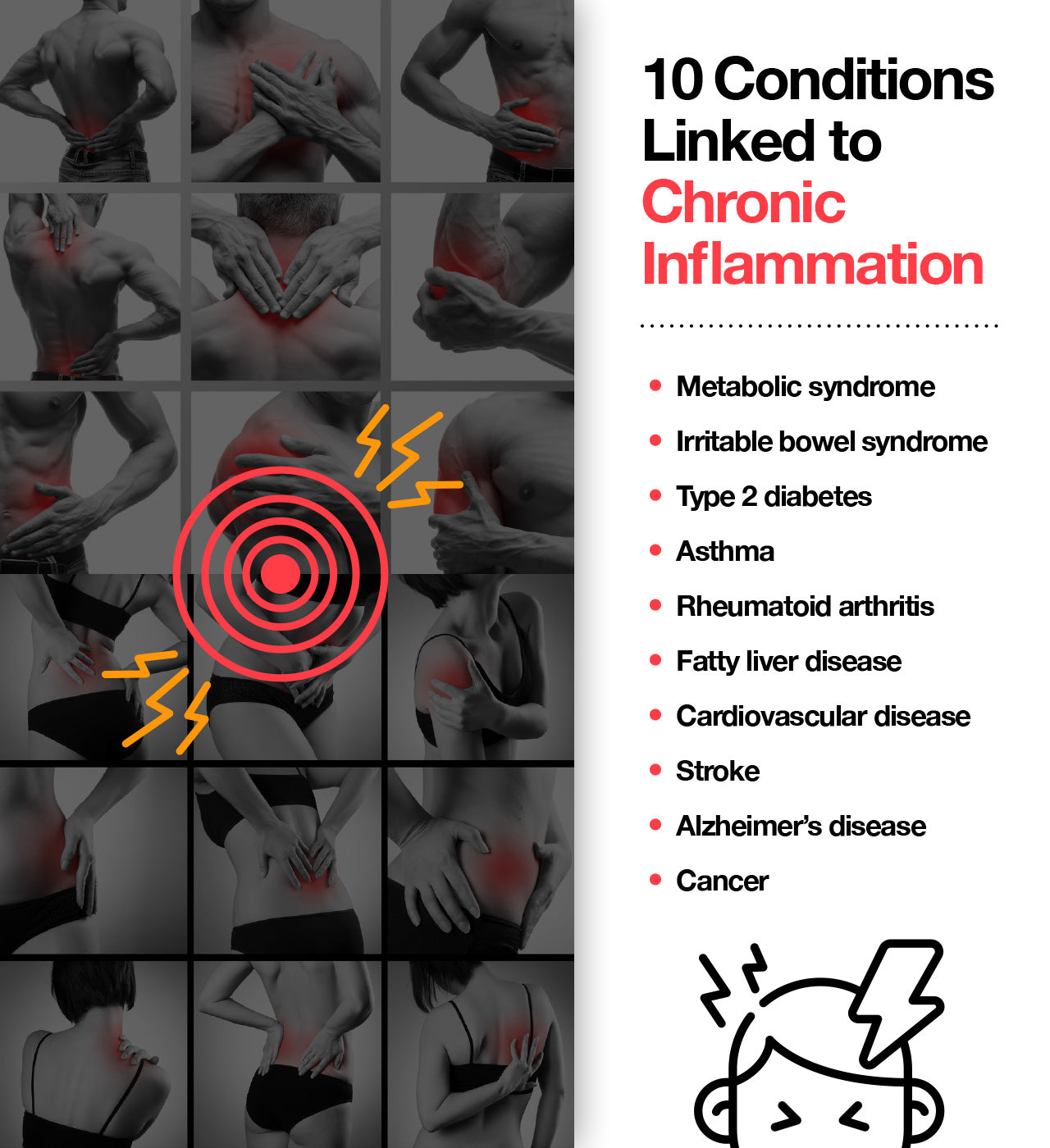Amino Acids for Inflammation: Treat and Prevent Health Problems with 5 Potent Anti-Inflammatory Amino Acids
 By: by Amino Science
By: by Amino Science

Chronic inflammation has been linked to many deadly modern diseases, including heart disease, type 2 diabetes, bone loss, depression, and even cancer. Instead of fighting chronic inflammation with pharmaceutical drugs, which can damage our organs over the long term, we can focus on preventative measures to reduce the risk of developing serious health problems. Recent studies focused on the use of amino acids for inflammation reduction have yielded highly promising results.
In this article, we will first examine the biological mechanisms that result in chronic inflammation and then explain how anti-inflammatory amino acids can combat systemic inflammation at its source.
What Leads to Chronic Inflammation?
Chronic inflammation is a complex condition, and experts have identified a host of risk factors that make individuals more likely to develop it, many of which are related to the overconsumption of inflammatory foods and other elements of a person's lifestyle.
The simplest way to conceptualize chronic inflammation, also referred to as systemic inflammation, is as an inappropriate immune response.
The inflammatory response is a defense mechanism activated by the immune system in response to threats like joint sprains or the presence of viruses. Inflammation shows up in different ways, including pain, redness, and swelling. Short-term inflammation is an integral part of the healing process, but when inflammation becomes chronic, it begins to cause health problems.
Chronic inflammation sets in when the immune system begins regularly releasing inflammatory chemicals (such as pro-inflammatory cytokines) in the absence of an injury or infection.
When left untreated, chronic inflammation can lead to the development of a variety of harmful health conditions, such as:
- Metabolic syndrome
- Irritable bowel syndrome
- Type 2 diabetes
- Asthma
- Rheumatoid arthritis
- Fatty liver disease
- Cardiovascular disease
- Stroke
- Alzheimer’s disease
- Cancer
Health care professionals can diagnosis chronic inflammation by testing for inflammatory markers in the bloodstream such as interleukin-1 and -6 (IL-1 and IL-6), tumor necrosis factor alpha (TNF alpha), homocysteine, and C-reactive protein (CRP).

The Benefits of an Anti-Inflammatory Diet Plan
Whether you hope to alleviate unpleasant symptoms associated with conditions linked to chronic inflammation or to combat its pernicious effects before they appear, adopting a proven anti-inflammatory diet is a highly effective treatment approach.
In a separate article, we provide an introduction to 25 powerful anti-inflammatory foods which we highly recommend you read. For the purposes of this article, we will be focusing exclusively on the benefits of amino acids for inflammation.
Making foods rich in omega-3 fatty acids the cornerstone of your anti-inflammatory diet plan is a choice that will pay dividends. That's because omega-3 laden foods like fatty coldwater fish and beans are also excellent sources of anti-inflammatory amino acids. Researchers have found that eating a diet replete with foods high in omega-3 fatty acids and amino acids can not only lower your risk of chronic diseases, but also help to enhance muscle growth and support healthy weight loss.
The Anti-Inflammatory Effect of Amino Acids
Amino acids are one of the most important types of nutrients—they make up proteins, which are needed in most biological processes in our bodies.
There are two basic types of amino acids relevant to conversations about human nutrition: the first can be made by the body and are therefore deemed nonessential amino acids (meaning that, under normal circumstances, it is not essential to supply the body with foods containing these amino acids), and the second are essential amino acids because humans must obtain them from the foods they eat. Both essential and nonessential amino acids play a crucial role in fighting inflammation.
The Top 3 Anti-Inflammatory Essential Amino Acids
The branched-chain amino acids (BCAAs) are a group of three essential amino acids:
- Leucine
- Isoleucine
- Valine
These amino acids—found in dairy, meat, and eggs, as well as other foods—are renowned for their ability to promote muscle growth and fuel significant strength gains. They also help reduce the time needed to recover between intense workouts by minimizing muscle damage and speeding up the rebuilding process.
Many of the most famous benefits of BCAAs can be attributed in part to their anti-inflammatory properties. It appears that, thanks to their anti-inflammatory capacity, BCAAs can be used for a number of medicinal purposes.
BCAAs show particular promise as a means of treating inflammation associated with liver disease. According to a study published in Nutrition, supplements containing a balanced formulation of leucine, isoleucine, and valine can have beneficial effects on hepatic encephalopathy, liver regeneration, and hepatic cachexia. They promote ammonia detoxification, correct the imbalance of amino acids in the blood, and stimulate protein synthesis. The authors conclude that, for certain groups of patients, "BCAA treatment can significantly improve the health-related quality of life and the prognosis of hepatic disease."
It's important to note here that the positive influence of BCAAs, and indeed, of any single amino acid, depends on the body receiving adequate amounts of all the other essential amino acids. Taking just the BCAAs can actually have adverse effects, such as depleting the body of B vitamins. For this reason, most people will experience the greatest effect when supplementing with a balanced blend of all the essential amino acids. Heal, our Surgical Recovery blend, was formulated to help maintain a healthy inflammatory response with a patented ratio of anti-inflammatory amino acids.
The Top 2 Anti-Inflammatory Nonessential Amino Acids
As touched on previously, your body can generate its own supplies of nonessential amino acids, meaning that under normal circumstances, there's no need to take in additional quantities of these amino acids. Chronic inflammation, however, is not a normal condition. Under these circumstances, it can be quite valuable to increase your intake of nonessential amino acids known to have potent anti-inflammatory effects. Two such nonessential amino acids are:
- Glutamine
- Glycine
Glutamine is not classified as an essential amino acid, but people who have gastrointestinal disorders or undertake intensive athletic training are often deficient in this amino acid, making it a conditionally essential amino acid in certain circumstances. Glutamine is used within the intestines, kidneys, and by the immune system—it has important antioxidant properties and can help reduce inflammation.
Studies in animal models (specifically, rodents and pigs) show that glutamine can help heal inflammatory bowel disease because this amino acid increases concentrations of friendly microbiota that support healthy digestion and decreases concentrations of hostile bacteria. Most animal proteins contain glutamine, and it can also be found in beans, spinach, cabbage, and parsley.
Another nonessential amino acid with pronounced anti-inflammatory benefits, glycine appears to be extra-effective for alleviating inflammation associated with:
- Ulcers
- Arthritis
- Diabetes
- Kidney and heart failure
- Neurobehavioral disorders
- Chronic fatigue
- Sleep disorders
- Certain cancers
A review published in Current Opinion in Clinical Nutrition & Metabolic Care examined the protective mechanisms responsible for glycine's impressive benefits. The authors found, among other things, that glycine suppresses the formation of pro-inflammatory substances such as inflammatory cytokines and free radicals. Glycine also protects against shock caused by hemorrhage and prevents ischemia and injury to a variety of tissues and organs including the liver, kidney, heart, intestine, and skeletal muscle. Ultimately, the authors determined: "Multiple protective effects make glycine a promising treatment strategy for inflammatory diseases."
It’s easy to incorporate more glycine into your diet. Animal proteins, including meat, dairy, and fish, contain glycine in combination with all nine of the essential amino acids that your body needs to thrive.
Bone broth, for example, contains glycine, a wealth of other amino acids, and natural collagen. If you are a vegetarian or vegan, you can find glycine in plant-based sources like beans, spinach, kale, cauliflower, cabbage, pumpkin, banana, and kiwi.

Amino Acids for Inflammation: The Bottom Line
Nutrition is the first line of defense against chronic inflammation and the raft of modern (and preventable!) illnesses linked to that condition. Eating a diet rich in amino acids—all the essential aminos, including the BCAAs—and nonessential aminos like glutamine and glycine, helps to reduce inflammation, decrease harmful bacteria, and prevent injuries.
While it's certainly possible to get all the amino acids you need for optimal health from diet alone, food restrictions, preferences, and lifestyle considerations (including a busy schedule) can make that challenging. To ensure you’re providing your body with the amino acids for inflammation it needs, consider supplementing with a complete essential amino acid formula.

Up to 25% off Amino
Shop NowTAGS: benefits
Join the Community
Comments (0)
Most Craveable Recipes




 833-264-6620
833-264-6620



















